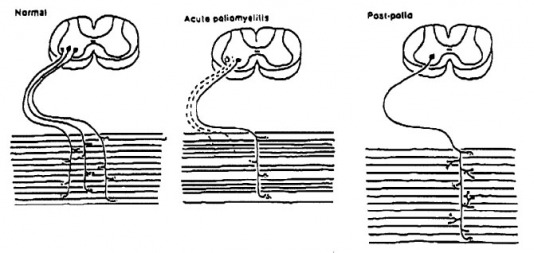Click here for General Background
What is Polio?

Polio attacks the nerve cells
(www.brown.edu)
(www.brown.edu)
"Poliomyelitis is a disease caused by infection with the poliovirus. The virus spreads by direct person-to-person contact, by contact with infected mucus or phlegm from the nose or mouth, or by contact with infected feces.
The virus enters through the mouth and nose, multiplies in the throat and intestinal tract, and then is absorbed and spread through the blood and lymph system. The time from being infected with the virus to developing symptoms of disease (incubation) ranges from 5 - 35 days (average 7 - 14 days).
Risks include:
Between 1840 and the 1950s, polio was a worldwide epidemic. Since the development of polio vaccines, the incidence of the disease has been greatly reduced. Polio has been wiped out in a number of countries. There have been very few cases of polio in the Western hemisphere since the late 1970s. Children in the United States are now routinely vaccinated against the disease.
Outbreaks still occur in the developed world, usually in groups of people who have not been vaccinated. Polio often occurs after someone travels to a region where the disease is common. Thanks to a massive, global, vaccination campaign over the past 20 years, polio exists only in a few countries in Africa and Asia."
~ National Institute of Health
The virus enters through the mouth and nose, multiplies in the throat and intestinal tract, and then is absorbed and spread through the blood and lymph system. The time from being infected with the virus to developing symptoms of disease (incubation) ranges from 5 - 35 days (average 7 - 14 days).
Risks include:
- Lack of immunization against polio and then exposure to polio
- Travel to an area that has experienced a polio outbreak
Between 1840 and the 1950s, polio was a worldwide epidemic. Since the development of polio vaccines, the incidence of the disease has been greatly reduced. Polio has been wiped out in a number of countries. There have been very few cases of polio in the Western hemisphere since the late 1970s. Children in the United States are now routinely vaccinated against the disease.
Outbreaks still occur in the developed world, usually in groups of people who have not been vaccinated. Polio often occurs after someone travels to a region where the disease is common. Thanks to a massive, global, vaccination campaign over the past 20 years, polio exists only in a few countries in Africa and Asia."
~ National Institute of Health
Personal Impact of Polio
"The psychological impact was huge. It was the one defining event in my youth. Allow me to explain. To go through elementary school with the constant awareness that I was no longer really 'normal' was a great factor in causing me to feel marginalized. At the time, I thought this was a great hurt and burden and, for someone between 7 and 12 it can be. After all, I didn't know of anyone else who had to go to physical therapy just to try to become 'normal' again. Then, after maturation, I slowly began to realize what a unique perspective this gave me. Somehow I have a way of understanding others who were marginalized in our society. I have spent my adult life working for the poor, the oppressed and bringing to light the narratives of those who are marginalized along with the achievements of those who are the typical success stories in our society."
~ Lauren Friesen from letter to authors
~ Lauren Friesen from letter to authors
